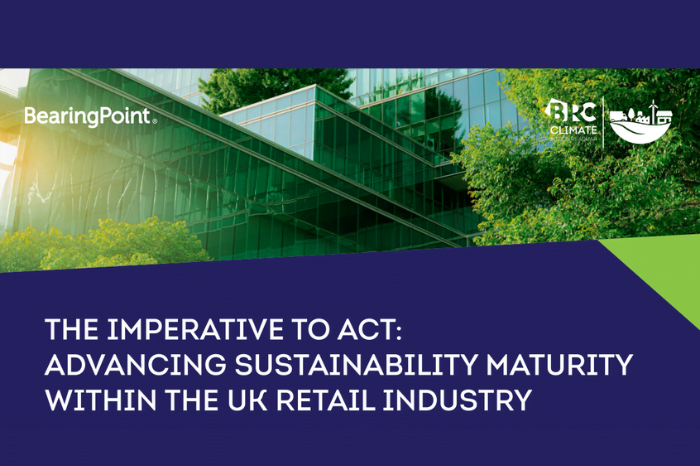UK Retail’s path to sustainability? BRC intel revealed
New study highlights major opportunities for UK retail to become more sustainable
A new study analysing the sustainability of the UK retail industry, through a survey of British Retail Consortium (BRC) members, has highlighted a number of key opportunities for UK retail to become a more sustainable industry.
Although the majority (85%) of major retailers surveyed outlined sustainability as a business driver, and most (72%) have a roadmap to go beyond minimum compliance, the study, The Imperative to Act: Advancing Sustainability Maturity within the UK Retail Industry by management and technology consulting firm, BearingPoint, identified four key opportunities for UK retail:
- Accelerate investment in data and technology – Many retailers haven’t yet invested in data and technology to drive sustainability reporting – with 87% relying on collecting sustainability data, such as Scope 3 emissions, manually. This is impacting on their ability to measure progress and inform decision making. By automating the process of collecting data, retailers will also have more time for value-adding activities such as co-development of new sustainable products.
- Incorporate long-term risks and ESG macro trends into strategy – Almost half (43%) of retailers were not yet considering the impacts of future ESG macro trends (within a 10/20/30 year timeframe) on their organisations strategy. Almost three quarters (74%) lack tools for simulating the effects of sustainability related changes. Retailers need to fully assess how different their future operating context could be and whether they have the right strategy to support this in the long-term.
- Collaborate with external stakeholders to ensure accountability and transparency – Retailers are collaborating with suppliers, but although over two thirds (70%) have taken steps to communicate the sustainability of their products, almost half (45%) were unable to state the % of revenue that comes from sustainable produces/services. Progress is required to build trust and transparently communicate their progress with customers and external stakeholders.
- Recognise the role of employees in driving sustainability – Retailers are not yet realising the benefits of driving employee buy-in. Around three quarters (74%) had no link between the achievement of sustainability targets and remuneration. Almost two thirds (60%) provided no training or merely basic awareness training to employees outside of the core sustainability team. Effective training and incentivisation will empower employees to deliver impactful change.
In 2020, the BRC launched the Climate Action Roadmap, which aims to ensure the Retail Industry and its supply chains are Net Zero by 2040. This is key to limiting global temperature rise to 1.5oC above pre-industrial levels. The importance of retail is clear, in 2017, the full lifecycle of the sector’s sold goods had a footprint of around 215 million tonnes of CO2-equivalent – 31% of all GHG emissions associated with UK consumption.
Stuart Higgins, Partner at BearingPoint said: “Our study shows that there are significant opportunities for UK retail to become a more sustainable industry. Crucially, there are four key areas where retailers need to focus their efforts to accelerate progress – from incorporating a longer-term view which includes future risks and ESG macro trends into their strategy, to automating data collection processes, and collaborating more effectively with external stakeholders. Finally, its vitally important for retailers to recognise the role of employees in really driving change across the organisation – not just relying on the core sustainability team to do this.
“By working closely with the BRC, and by utilising BearingPoint’s Sustainability 360 methodology, we have been able to benchmark the UK Retail sector’s preparedness to deliver its sustainability agenda. This is a groundbreaking piece of work that will help the UK retail sector to meet the growing demands for sustainable retailing from its customers and from its shareholders and investors.”
Tracey Banks, Climate Action Roadmap Manager at the British Retail Consortium, said: “This report shows that for most retailers, sustainability is a business driver. They are working beyond compliance and taking account of the risks that climate change poses to their future. Almost two thirds of respondents already report on Scope 1,2 and most Scope 3 emissions and the majority also encourage sustainability engagement through staff forums.
“However, there is still much to do. We need to see greater weight given to sustainability criteria in sourcing; clear links between achievement and renumeration at all levels and increased use of technologies for measuring and monitoring in order to drive down emissions. It is also key, given that 40% of respondents did not know what proportion of their revenue came from sustainable products or services, that retailers take the opportunity to grasp how sustainable products drive their portfolios.”
BearingPoint has recently been recognised as a major player for ESG Program Management Services in the IDC Marketplace. This confirms the company’s success in building a full set of ESG related capabilities such as its Sustainability Maturity Assessment 360°, Carbon Emission and Roadmap Design, ESG Data Hub and its ICare Academy, which collectively allows BearingPoint to design and execute a wide variety of complex ESG transformation programs.
TRBs take on strategic recommendations following the report:
- Enhance data capabilities: Retailers must urgently invest in digitalisation to streamline sustainability data collection and analysis. This foundation will enable more strategic decision-making and operational efficiency.
- Incorporate ESG trends: Integrating long-term ESG trends and risks into the strategic planning process will ensure businesses are prepared for future challenges and opportunities.
- Strengthen stakeholder engagement: Actively engaging with all stakeholders, including fostering transparent communication and collaboration, will enhance accountability and drive collective action towards sustainability goals.
- Invest in employee engagement: Encouraging employee participation through training, incentives, and embedding sustainability into all levels of operation will catalyse the sector’s transition to a sustainable future.
This seminal report not only benchmarks the current sustainability maturity of the UK retail sector but also lays down a roadmap for acceleration towards a sustainable, resilient, and inclusive future. It’s a call to action for all stakeholders to elevate their commitments, collaborate more deeply, and innovate sustainably to meet the growing demands of consumers, investors, and the planet.














